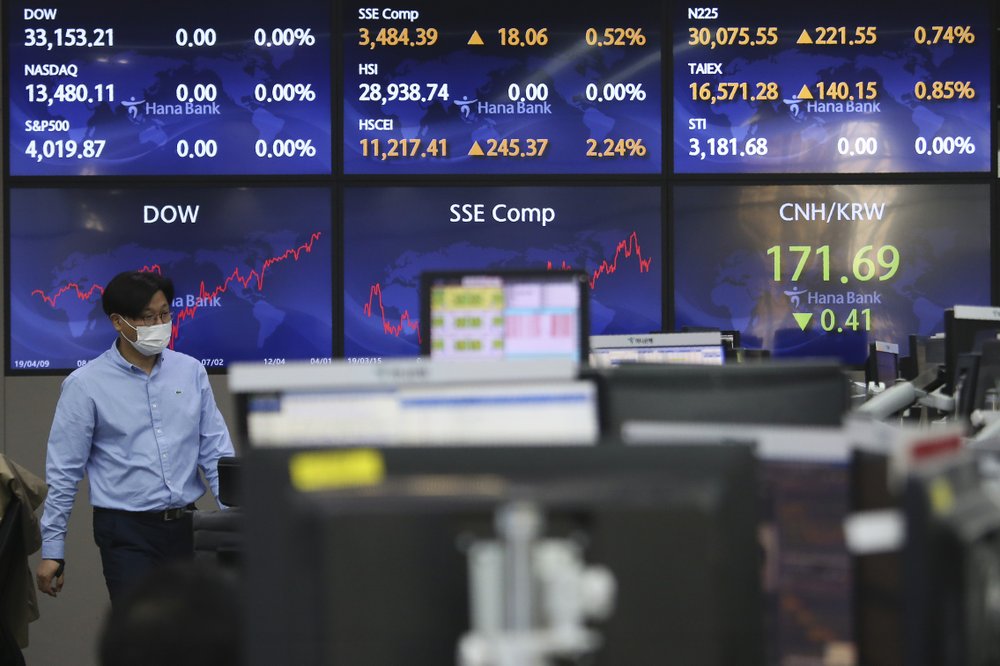

World shares were mostly higher Thursday although Tokyo’s benchmark declined as reports of rising coronavirus cases raised alarm over another setback in the recovery from the pandemic.
Germany’s DAX rose 0.2% to 15,199.69 while the CAC 40 in Paris climbed 0.5% to 6,160.41. Britain’s FTSE 100 edged 0.1% higher to 6,890.55.
The future contract for the S&P 500 added 0.3% to 4,083.30. The future for the Dow industrials gained less than 0.1% to 33,348.00.
Trading has been subdued this week as many countries grapple with a resurgence of COVID-19 cases and hospitalizations as new infections appear to be outpacing inoculations in many places.
Tokyo reported 545 new cases Thursday, the highest since early February, and its governor asked the central government to let her issue binding orders under a new virus prevention law that includes penalties for business owners who defy measures and compensation for those who comply. Osaka in western Japan declared a medical emergency as its hospitals became inundated with new cases.
New cases in India hit a record on Thursday with 126,789, as Prime Minister Narendra Modi got his second shot and urged others to follow suit, saying “vaccination is among the few ways we have to defeat the virus.”
The Nikkei 225 index slipped 0.1% to 29,708.98, while the Hang Seng in Hong Kong jumped 1.2% to 29,008.07. In Seoul, the Kospi edged 0.2% higher to 3,143.26. Australia’s S&P/ASX 200 gained 1% to 6,998.80. The Shanghai Composite index added 0.3% to 3,482.55.
Investors are showing cautious optimism about the economic recovery, especially in the US, where vaccine distribution has been ramping up and President Joe Biden has bumped up his deadline for states to make doses available to all adults by April 19.
On Wednesday, the benchmark S&P 500 inched up 0.1% to 4,079.95. The Dow Jones Industrial Average gained 0.1% to 33,446.26. The Nasdaq composite slipped 0.1% to 13,688.84. The S&P 500 and Dow each set record highs on Monday.
Small company stocks, which have been outgaining the broader market this year, took the brunt of the selling. The Russell 2000 index of smaller companies gave up 1.6%, to 2,223.05. The index is up 12.6% so far this year, while the S&P 500, which tracks large companies, is up 8.6%.
Analysts expect the economy to recover this year, but they also anticipate the market remain choppy as investors shift money to companies and industries that stand to benefit as the pandemic eases. A proposal to invest heavily in major infrastructure, from roads and ports to broadband, education and training could hasten that rebound.
Shares were little changed Wednesday following the release of minutes from the Federal Reserve’s latest meeting on interest rate policy.
The minutes revealed that Fed officials were encouraged last month by evidence the US economy was picking up, but they showed no sign of moving closer to ending their bond purchases or lifting their benchmark short-term interest rate from nearly zero.
Investors were reassured by the Fed’s “very optimistic and balanced tone of more growth and transitory inflation,” Stephen Innes of Axi said in a commentary.
“And it keeps US investors in the candy store mode while feeding off the infrastructure stimulus sugar rush.”
The yield on the 10-year Treasury was steady at 1.65%.
In another trading, benchmark US crude oil lost 34 cents to $59.43 per barrel in electronic trading on the New York Mercantile Exchange. It picked up 44 cents to $59.77 per barrel on Wednesday. Brent crude, the international standard for pricing, gave up 21 cents to $62.95 per barrel.
The US dollar slipped to 109.46 Japanese yen from 109.85 yen. The euro rose to $1.1881 from $1.1868.